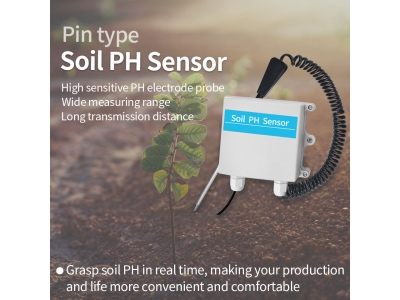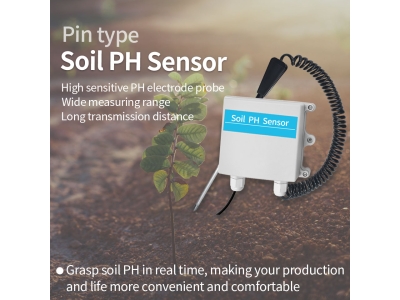Introduction In recent years, the agriculture industry has been undergoing a significant transformation towards more sustainable and efficient farming practices. With the growing global population and increasing pressure on natural resources, it has become
imperative for farmers to adopt innovative technologies to improve their productivity while minimizing their environmental impact. One such technology that has been gaining traction in the farming community is the use of soil sensors. These devices are
revolutionizing the way farmers manage their land, allowing them to make data-driven decisions that optimize their crop yields and reduce their resource usage. In this article, we will explore the role of soil sensors in sustainable farming practices and the impact they are having on the agriculture industry.
The Importance of Soil Health Soil health is a critical factor in determining the success of a farm. Healthy soil provides the essential nutrients and support that crops need to grow and thrive. However, maintaining soil health is a complex and dynamic process that is influenced by a multitude of factors such as temperature, moisture, pH levels, and nutrient content. Traditionally, farmers have relied on visual inspections and manual sampling to assess the condition of their soil. This approach, however, is time-consuming, labor-intensive, and often provides only a limited snapshot of the overall soil health. As a result, farmers may struggle to identify and address potential issues before they impact their crops. This is where soil sensors come into play.

The Role of Soil Sensors Soil sensors are cutting-edge devices that are designed to monitor and analyze various soil parameters in real-time. These sensors can be installed directly into the ground, allowing them to collect continuous data on soil moisture, temperature, salinity, and nutrient levels. This data is then transmitted to a central system where it can be analyzed and used to inform farming decisions. By providing farmers with a comprehensive understanding of their soil conditions, soil sensors enable them to optimize their irrigation, fertilization, and planting strategies. This not only improves crop yields but also reduces water and fertilizer usage, leading to cost savings and environmental benefits.
Sustainable Farming Practices The integration of soil sensors into farming operations has enabled farmers to adopt more sustainable practices that prioritize environmental stewardship and long-term viability. By accurately monitoring soil moisture levels, for example, farmers can implement precision irrigation systems that deliver water directly to the roots of their crops, minimizing waste and reducing the risk of overwatering. Similarly, by monitoring nutrient levels, farmers can apply fertilizers more efficiently, ensuring that their crops receive the right amount of nutrients without excess runoff that can pollute waterways. These practices not only benefit the environment but also contribute to the overall resilience and profitability of the farm.
Case Studies The impact of soil sensors on sustainable farming practices can be seen in numerous case studies from around the world. In California, a state known for its agricultural production, farmers have been using soil sensors to manage their water usage more effectively in response to drought conditions. By leveraging real-time data on soil moisture, these farmers have been able to optimize their irrigation schedules, resulting in significant water savings without compromising their crop yields. In Australia, where arid conditions pose a challenge to farming, soil sensors have been instrumental in helping farmers monitor and manage their soil salinity levels, allowing them to cultivate crops in areas that were previously unsuitable for agriculture. These examples demonstrate the tangible benefits that soil sensors can bring to sustainable farming practices.
Challenges and Opportunities While soil sensors hold great promise for sustainable farming, there are still challenges that need to be addressed to maximize their potential. One such challenge is the accessibility and affordability of soil sensor technology, particularly for small-scale and resource-constrained farmers. The initial investment in soil sensors and the associated data management systems can be prohibitive for some farmers, limiting their ability to adopt this technology. Additionally, there is a need for further research and development to enhance the accuracy and reliability of soil sensors, particularly in diverse soil types and conditions. Despite these challenges, there are also opportunities for collaboration and innovation to drive the widespread adoption of soil sensors in farming. Government incentives, industry partnerships, and technological advancements can all contribute to making soil sensors more accessible and effective for farmers of all scales.
Conclusion The role of soil sensors in sustainable farming practices cannot be understated. These innovative devices are empowering farmers to make data-driven decisions that optimize their crop yields, minimize resource usage, and protect the environment. As the agriculture industry continues to evolve, the integration of soil sensors into farming operations will be pivotal in driving sustainability and resilience. By harnessing the power of technology, farmers can sow the seeds of success for a more sustainable and productive future.






